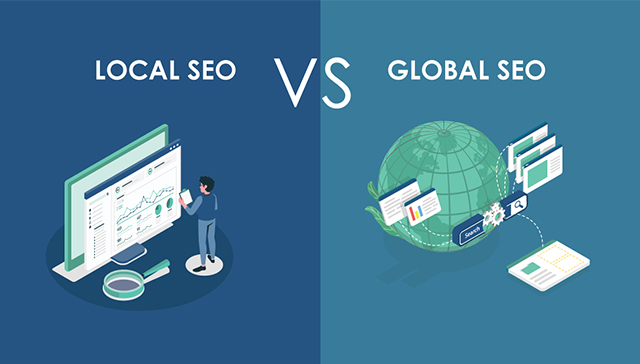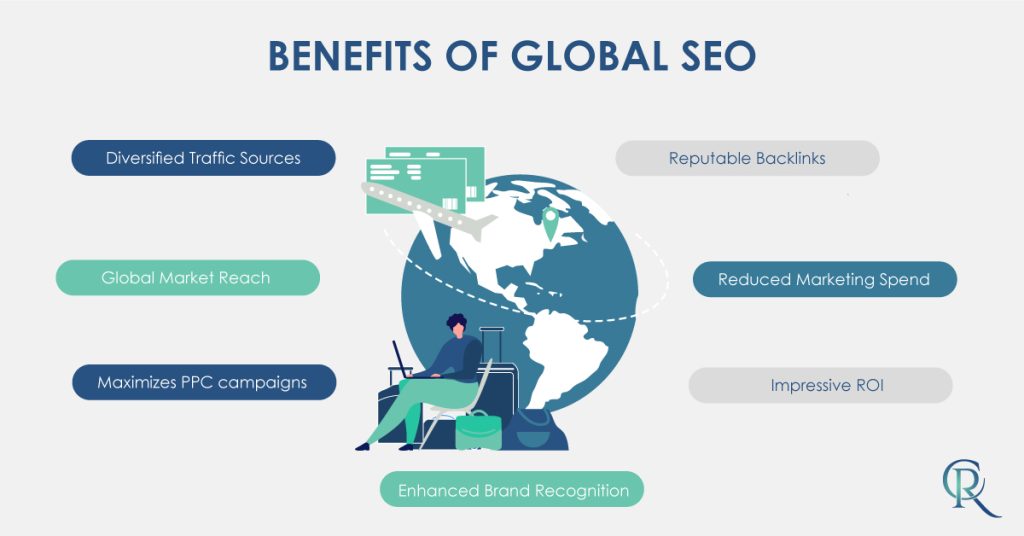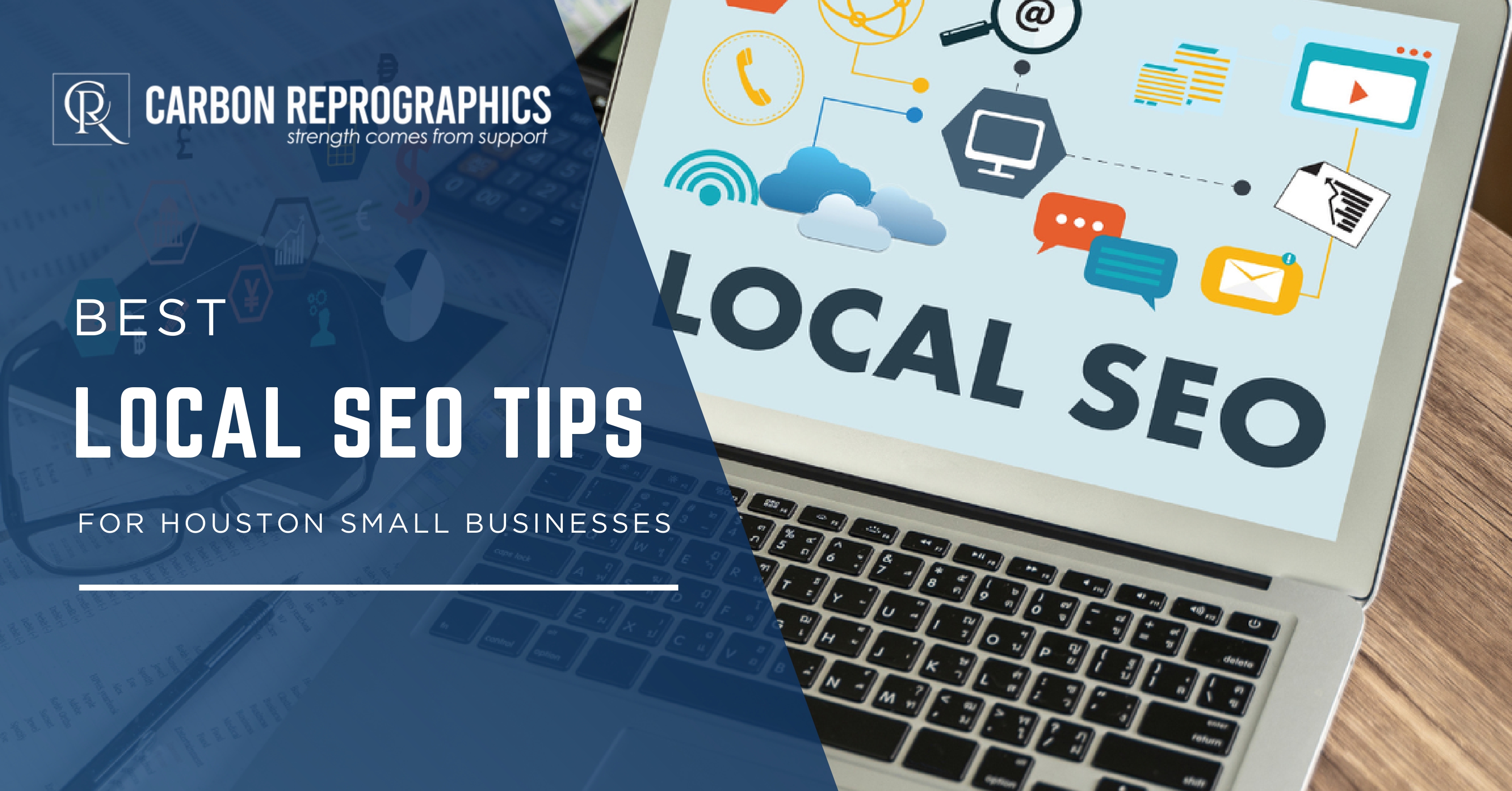
Local SEO vs Global SEO: What’s the Difference and Which One Should You Choose?

Search Engine Optimization (SEO) helps your website rank higher on Google so more people can find your business. But the best strategy depends on your target audience. If you want customers from one city or service area, Local SEO is the right focus. If you want customers from multiple countries, Global SEO (also called international SEO) is the better choice.
Local SEO vs Global SEO
Local SEO improves rankings in a specific city or service area (including map results). Global SEO improves rankings across multiple countries and languages. If your customers live nearby, choose Local SEO. If your customers live worldwide, choose Global SEO.

What is Local SEO?
Local SEO is the process of improving your website and Google Business Profile so your business ranks for location-based searches like “near me” or “service in city.” It helps local customers find you through Google Maps, local listings, and region-specific keywords. Local SEO works best for businesses with physical locations or service areas.

What is Global SEO?
Global SEO (also called international SEO) is the process of optimizing a website to rank in multiple countries or languages. It targets international audiences by using country-specific keyword research, multilingual content, and technical setup like hreflang tags. Global SEO works best for multinational brands and websites that sell globally.
What is the Difference Between SEO and Local SEO?
SEO is a broad term that includes all strategies to improve rankings on search engines. Local SEO is a specific type of SEO that targets local search results, Google Maps, and location-based queries. That is why many people search for “difference between SEO and local SEO” when choosing between strategies.
Local SEO vs Global SEO Comparison Table (Featured Snippet Format)
| Feature | Local SEO | Global SEO |
|---|---|---|
| Primary goal | Rank in one city or region | Rank in multiple countries |
| Best for | Local services + physical stores | International brands + global e-commerce |
| Target audience | Local customers nearby | Worldwide customers across regions |
| Keyword focus | Location-based keywords (city, area, “near me”) | International keywords (country + language variations) |
| Google tools used | Google Business Profile (GMB) + local listings | Hreflang tags + multilingual SEO tools |
| Content strategy | Local services, local pages, local topics | Country-specific pages + translated localized content |
| Domain structure | Single domain works well | ccTLDs, subdomains, or subdirectories |
| Link building | Local backlinks + citations | International backlinks + regional authority building |
| Competition level | Often lower | Often higher |
| Time to see results | Usually faster | Usually slower due to broader markets |
Critical Elements of Local SEO (Ranking Factors)
- Google Business Profile (GMB) Optimization
- Optimize your Google Business Profile with accurate categories, updated hours, service areas, photos, and posts. This helps you rank in Google Maps and local search results.
- NAP Consistency (Name, Address, Phone)
- Keep your business name, address, and phone number consistent across all platforms. Inconsistent NAP data can confuse search engines and reduce local rankings.
- Local Citations + Local Listings
- Submit your business to trusted local directories to build credibility and increase local visibility.
- Local Link Building
- Earn backlinks from local websites such as community blogs, news portals, schools, chambers, and partner businesses.
- Reviews + Reputation Management
- Encourage genuine customer reviews and reply professionally. Reviews improve trust and local ranking signals.
Core Elements of Global SEO (International Ranking Factors)
- Country-Specific Keyword Research
- Research how people search in each country. The same product can be searched differently across regions, even in the same language.
- Multilingual Content + Cultural Localization
- Translate content accurately and adapt it for cultural tone, currency, offers, and preferences.
- Hreflang Tags
- Hreflang tags help Google serve the correct page based on user location and language. This avoids duplicate content issues and improves international rankings.
- International Domain Strategy
Choose the correct structure based on your goals:
- ccTLDs (example.fr, example.de)
- Subdirectories (example.com/fr/)
- Subdomains (fr.example.com)
- International Backlinks
- Build backlinks from relevant websites in the target region to improve authority in that country.
How to Choose Between Local SEO and Global SEO (Decision Guide)
- Choose Local SEO if:
- You serve a specific city, region, or service area
- You want calls, visits, or leads from nearby customers
- You rely on Google Maps and local visibility
- Choose Global SEO if:
- You sell products/services internationally
- You want traffic from multiple countries
- You want multilingual content and international growth
- Choose Both Local and Global SEO if:
- You have a local branch plus international shipping
- You want local leads and international sales simultaneously
FAQs:
How will I know if I need Local SEO Vs Global SEO?
If your customers are near your business location, use Local SEO. If your customers are spread across countries or regions, use Global SEO.
Is it possible to use both Local SEO Vs Global SEO for my business?
Yes, many businesses can benefit from both strategies, especially if they have local branches but also serve a global market online.
How does Local SEO improve my business online appearance?
Local SEO improves visibility by making your business appear in local search results, local map packs, and on platforms like Google Maps, increasing foot traffic and local customer engagement.
How can Global SEO enhance my online presence?
Global SEO enhances online presence by making your website accessible and relevant to users across different countries and languages, thereby expanding your targeted market reach.
How much time does it take to see results from Local SEO Vs Global SEO?
Results can vary, but typically, Local SEO may show results within a few months, whereas Global SEO can take longer, often six months to a year, due to the broader scope of competition and strategies involved.
Can I transition from Local SEO Vs Global SEO as my business grows?
Yes, you can transition from Local SEO to Global SEO as your business expands. It is wise to use local SEO strategies at first and transition them to a global aspect. This approach will involve updating your SEO strategy to include international targeting and broader keyword strategies.
Can I use both Local SEO and Global SEO?
Yes. Many businesses use both strategies by creating local service pages for cities and separate international pages for countries and languages.
How long does it take to see results?
Local SEO often shows faster improvements within 3–4 months. Global SEO can take 6 months or longer because international markets have higher competition.
Can I switch from Local SEO to Global SEO later?
Yes. Many businesses start locally and expand globally once they build authority and stable rankings in their region.
Ending Notes!
Local SEO and Global SEO both improve visibility, but they serve different purposes. Local SEO targets one area and drives nearby leads. Global SEO targets international audiences and supports global expansion. If you want consistent organic growth, choose the strategy based on your customer location, website goals, and long-term market plan.


